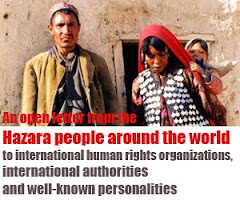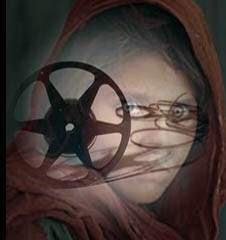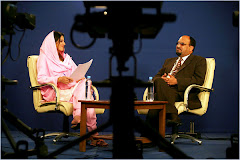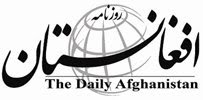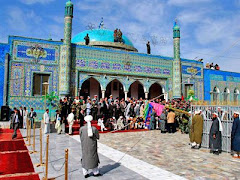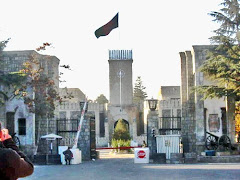
Finally "The Kite Runner" has been released in the USA after a delay from it’s original date in November. I just feel sorry I will not to be able to watch it right away, since it will be released later in Italy, where I am now. I am not writing as a critic or to comment about the film, since I haven't watched it yet, but like millions of other readers of the novel and especially as a Hazara, like of one of the main characters, I would like to raise some points about it.
For me first as a young Afghan filmmaker who has a long way ahead to make films and then as a person who has seen all this racial and ethnic discrimination, war, oppression and ethnic conflicts with his own eyes in his country, it is very good to see how a novel can change the image of a country.
So much of what has been depicted of Afghanistan in the minds of people especially in the West, is a picture of ruins with aggressive inhabitant. When Afghanistan is considered, some people think of terror, Taliban, drugs, bombings and all harshness. Then when we explain to them more about what Afghanistan is really like, they pretend that now they have a clearer image of Afghanistan. But we know they are still doubtful because hearing something is never like seeing something with your own eyes or reading something strong. Based on this point, I believe cinema and literature can play an effective role in depicting the reality and distinguishing it from the rumors or wrong imaginings.

The “Kite Runner” a brief history of three decades of Afghanistan
Reading "The Kite Runner," I really felt very close to the characters, since I as a Hazara Afghan, know what is my country like, who are the ethnics, what are their traditions, how is the social lives of people, what happened to my country in the 1980s, and 1990s, and all that has occurred since the fall of the Taliban. Reading the Kite runner I could imagine what is happening, because it is written so well.
The ethnic discrimination visualized in this book is a part of our history, which is even worse, in reality, than any novelist can imagine.

Regarding the film:
It has been a trend to make films of best-seller novels for a long time. Usually these films have been successful. Since I haven't been able to watch the film yet, I will ask my friend Mr. Robert Maier who lives in the USA and must have watched it by now, to write his comments on the film, since he has been in the industry for years, and knows Afghanistan and Afghans well. I will then post it here.
I will write here mainly on how this film is similar to or different from others made in or about Afghanistan in recent years.
In the 1980s two filmmakers were interested in Afghanistan as themes of their films: Peter Macdonald who made “Rambo 3” in 1988, and Kevin Reynolds who made "The Beast of War” in 1988. Both are the result of interest in Afghanistan because of the cold war while John Frankenheimer made his historical film “The Horsemen” in Afghanistan in 1971.
This trend has increased two decades later, after the prohibition on films and filmmaking ended with the ouster of the Taliban in 2002.
During the Taliban time some films were made in Afghanistan and some were produced on the borders of Afghanistan with Afghan themes. "Trip to Kandahar" was made by Mohsin Makhmalbaf the Iranian filmmaker in Iran border of Afghanistan in 2001 and " In This World" was made in 2002 by Michael Winterbottom in the Afghan refuge camps in Peshawar Pakistan. The latest one out of Afghanistan but about Afghanistan is "The Kite runner" by Marc Forster. (Editor’s note: “Charlie Wilson’s War” is currently in release, and other Western-produced films with Afghan subjects will be released in 2008.)
Other foreign feature and television films that where made inside Afghanistan after the fall of the Taliban government such as:
"I Love Peace" by Yutaka Osawa, the Japanese Director in 2002,
"Five In The Afternoon" by Samira Makhmalbaaf the Iranian female director in 2003,
"Earth and Ashes" by Atiq Rahimi the Afghan French novelist* and Director in 2004
"Soldier Star" by Christoph Dopamphiele the French Director in 2005 ( who then later suicide himself and was dead)
"Spring of Hope" by Hashmat khan the Afghan Indian Director/ Actor in 2006 and
"Kabul Express" by Kabir Khan the Indian Director in 2006
 Of these films, some are similar to "The Kite Runner" in theme and content or composition of main crew. For instance not the content but the project of "Earth and Ashes" are similar to "The Kite Runner" because it is also adapted from a best seller Afghan Novel which was written by Atiq Rahimi in the French language and was then adapted into a screenplay by Kambuzia Partovi the Iranian director and screenwriter, and then was directed by the author and a French crew.
Of these films, some are similar to "The Kite Runner" in theme and content or composition of main crew. For instance not the content but the project of "Earth and Ashes" are similar to "The Kite Runner" because it is also adapted from a best seller Afghan Novel which was written by Atiq Rahimi in the French language and was then adapted into a screenplay by Kambuzia Partovi the Iranian director and screenwriter, and then was directed by the author and a French crew. The form of "Spring of Hope" that is written and directed by Hashmat Khan Rahimi the Afghan Indian Director/ Actor in 2006 with an Indian crew is similar to "The Kite Runner" because it depicts the history of three decades of war and the changing of regimes. The difference is that he has focused on the lives of two lovers in Kabul University, and quarrels of the Mujahedin and then Taliban and so on. But "The Kite Runner" explores a bit more in depth the bottom layers of society and explains more about the ethnic conflicts and discrimination, and especially Pashtun oppression of the Hazaras.
The third one that is a bit similar with "The Kite Runner" according to its content and generating of controversy is "Kabul Express," made in 2006. It was very controversial in Afghanistan this year and was finally banned by the Ministry of Information and Culture of Afghanistan after there were many objections by the people against it.

This film was written and directed by the Indian Director Kabir Khan in cooperation with Afghan Films Department and another local Afghan film production company.
The plot of this film is the story of two Indian journalists who were kidnapped by Pakistani Taliban when the Taliban were escaping under attack of the American and coalition forces. But at the same time this film had some scenes un-related to the content of the film and considered to be insulting to the Hazaras of Afghanistan without a reason. Therefore many Hazaras including their leaders, whether inside or outside of Afghanistan opposed this film and showed their objections with demonstrations, gatherings and other forms of objections. These actions finally caused this film to be banned in Afghanistan by the Ministry of Information and Culture.

My words to Hazara youth
And now again there is fear that the Hazaras may “The Kite Runner” film too since they have been communicating about this issue with each other.
Although there are some Hazara youth who are preparing to oppose this film, I believe this book and this film are like an apology for the oppression of one generation to another, in the form of a story.
I believe the Hazaras are portrayed to be poor, under pressure, and the underdog, and though they were treated badly during the 1970s and then late 1990s they were actually sincere, loyal, honest and brave.
I believe one reason that made "The Kite Runner" a best seller first in the USA and then throughout the world was the way the author depicted the circumstances and characters in his novel and the way he has revealed some of the truths which have not been told or written elsewhere.
Indeed the author has entered into the souls of the characters and without bias or taking either side and created a realistic and believable environment, which may have been inspired by and mixed with some of his own childhood memories and experiences that depict at least part of three decades of history of Afghanistan very clearly.
Therefore I suggest that Hazara youth,not oppose the film but instead watch it and then try to make another artistic work that they think would depict a better image of the contemporary Hazara ethnic and society or at least to write a reasonable comment or critique about "The Kite Runner."
I think what is not written in the history will need people like Khaled Husseini to communicate, whether in the form of novel or in another literary form just to point out and remind people about it, because the sun is never covered with two fingers.
I think it is better to let the world know that there was a Hazara boy named Hassan and there was a Pashtoon boy named Amir once in Afghanistan and let them judge who was right and who was wrong in the game of life and what were the causes and reasons for it.
Although a Hazara woman is raped, a Hazara boy is raped in the street in front of many people, and a Hazara orphan is taken as a hostage to dance for the Taliban in this novel, on the other hand, how oppressive some of Pashtoon were, how cruel the Taliban were, and how people behaved with Hazaras were depicted with reasons and I am sure a person who had lived in Afghanistan during the 1960s and 1970s and the late 1990s must have seen have seen with their own eyes. Therefore don't you think, there were even worse things and more cruelty against the Hazaras throughout the history but no one has written them yet?!
It is very important for me when a book and or a film can draw the attention of the world towards a country.
Nowadays once again Afghanistan will be under the focus of the world after the release of the film, as it has been a forgotten country after the war of Iraq in 2003.
I believe "The Kite Runner" is a masterpiece and a tremendous achievement since this book was famous worldwide and was translated into dozens of languages around the world.
I have seen the effect it has left on the foreigners in different corners of the world. For instance, as I have experienced since then any time I met a new foreigner and the soon he or she knew that I was Afghan, the second question from me was " Are you from the ethnic background of Amir or Hassan?"
For me that is a great achievement of the author to create such characters in his novel to remain in the minds of people.
I would send my congratulations to Khaled Husseini, the author of the novel, David Benioff the screenplay writer and to Marc Forster the director of the film through this piece of writing.
I think Afghanistan still needs some time to be able to digest and absorb such films and
I am concerned about the lives of Afghan child actors who played the childhood roles of Hassan and Amir and glad they are brought to the UAE to be safer there.
My last words
Seeing the world wide achievements of "The Kite Runner" I am more committed to do my best to depict the true and real images of my country by my films on which I am working day and night, to change the unrealistic images and wrong visions of my country in the minds of people in the West.
Sometimes I just think of six years back when Mullah Omar also got world-wide fame for Afghanistan for drugs, terror, bombings, destruction and killing. Then when I hear about Khaled Hussieni and his novel, I feel more confident that a person can change the world if he wants, he can enter the hearts of people and can bring a positive name and reputation for his native country, and depict a true picture of his homeland and people.






